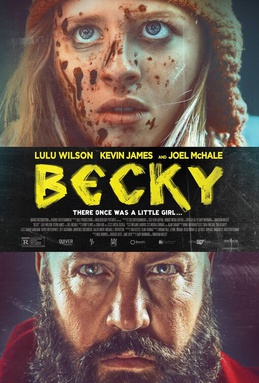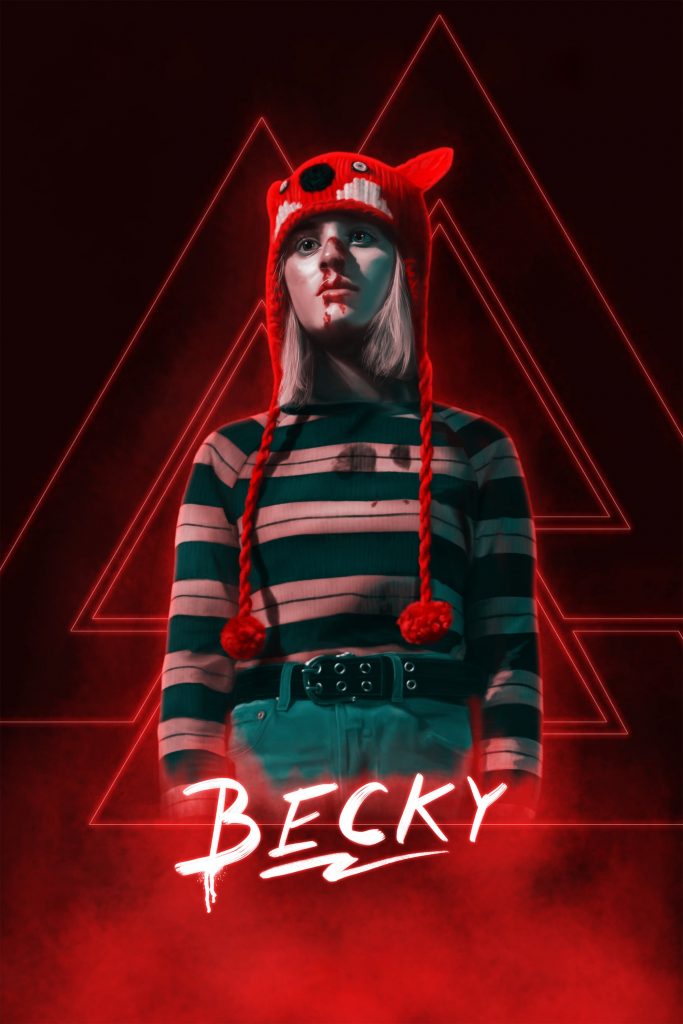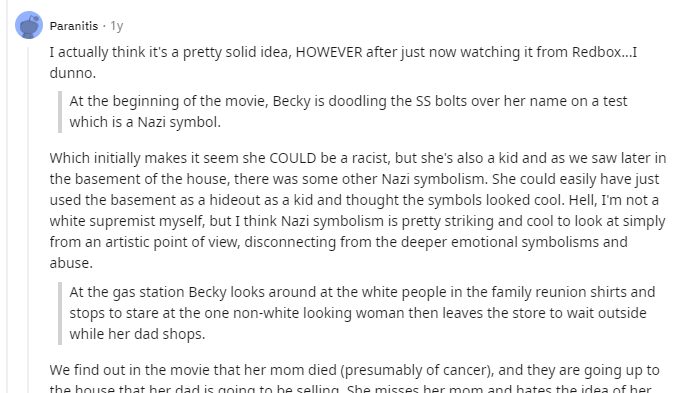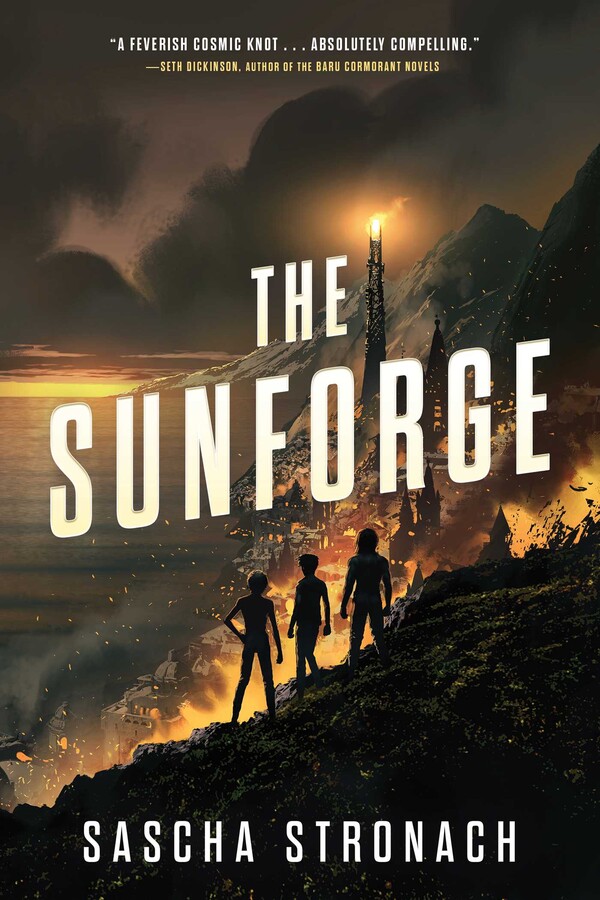This post will contain spoilers for the 2020 film Becky, and also talk a whole bunch about Nazism, so if either of those things is gonna be a problem, skip this one.

Becky is a film that leaves a lot of questions unanswered. Or, it isn’t at all, but it a lot of its backstory and its villains’ motivations is never made explicit – it relies instead on implication, but that implication is not subtle. Let’s get the plot basics out of the way:
- Becky is a 13 year-old girl. Her mother has died at some point in the last few years, and now her father is dating Kayla, a woman of colour.
- They are together at the family’s cabin when a group of Neo-Nazis break in and hold them hostage, looking for a key with a valknut (a Norse rune commonly used by Nazis, also prominently tattooed on the Neo-Nazi leader’s hand) engraved in it that they believe is on the property. The cabin was owned by Becky’s mother for a long time prior to her death.
- Becky escapes the Neo-Nazis, the rest of the film is basically Home Alone x Rambo. At the end of the film, she is seen clutching the key to her chest.
We’re never actually told what the key opens, or why the Nazis chose this cabin, but I’m just gonna say what I think is very strongly implied by the text:
Becky’s mother was the member of the Neo-Nazi gang. She didn’t get caught during some big score, and she hid whatever they stole in the cabin basement. Becky knows her mom was a Nazi and is not just cool with it but actively sympathetic to the cause. She is motivated not by hatred of the Nazis or desire to save her new family but because she wants to keep the money.

Which is … apparently controversial? In a reddit thread on the topic, a user leaps to Becky’s defence and says that these are all perfectly normal teenage behaviours, which is bizarre to me. It’s a popular, upvoted response too. The film never explicitly states that Becky is cool with Nazis but, well … that’s not how film works.

In one of the first shots we see of Becky, in the first 5 minutes of the film, she is seen scribbling a pair of lightning bolts on her school work, beside her name. This occurs in the film’s timeline before she meets the Neo-Nazis, so she didn’t learn it from them. It’s honestly a pretty blink-and-you’ll-miss it shot, but once somebody points it out it’s pretty obvious. They’re drawn in a way that’s clearly meant to be a little ambiguous – they don’t look like SS Lightning Bolts, they look like two regular lightning bolts beside each other. I wish I could get screenshots, but Netflix gonna Netflix, but either watch it yourself or take it on my word that if this were a regular teenager you could believe that maybe they were just really into Harry Potter or something.
However, you’re missing a key factor: this is a film and that decision was intentional. It’s one of the very first things we see her doing. The director chose to establish Becky by having her scribbling twin lightning bolts on her school work.
Becky also shows open hostility towards Kayla, and again, if this were a real-life teenager you could absolutely say “what 13 year-old likes their mom’s new girlfriend?”
But Kayla is a woman of colour. They cast a black woman to play her (Amanda Brugel), and had the script draw attention to it; the Nazi leader does a speech about how his dogs are purebreeds, then glares at a black woman who is dating a white man while saying that mixing races makes them weaker. The screenwriter wants you to know in no uncertain terms that she is a black woman dating a white man, and that’s a thing Nazis take issue with. You know who else takes issue with that relationship?

If you believe this hostility is meant to be just normal teenager who doesn’t like her stepmom, then what purpose does it serve in the film? There’s no real arc about them becoming closer, and they barely even interact again until the very end of the film. It’s there intentionally, so why is it there? It does give Becky a pretence to not be in the cabin when the Nazis arrive, but they could’ve done that in a thousand ways that didn’t involve her glaring at a black woman and saying “my mom would’ve hated you.” Pointed word choice. Which again, if this happened in real life could mean anything, but since it happens in a film that is explicitly about Nazism, and in combination with everything else, starts to paint a picture that maybe Becky’s motivations aren’t those of an average teenager.
Becky also has blonde hair and blue eyes, neither of which are notable in the general populace but START TO MEAN SOMETHING WHEN TAKEN IN LIGHT OF THE FACT THAT CASTING CHOICE WAS AN INTENTIONAL DECISION BY THE FILMMAKERS, ARE YOU GETTING THE POINT YET.
There’s a tendency for fans to respond to media as though it’s Stuff That’s Really Happening rather than something been intentionally crafted. Dan Olson calls it the Thermian Argument. It’s often used to cover for weird and creepy material (“she’s really 1000 years old!”) but that same tendency also just leads to, well … a whole lot of really bad analysis. Dan obliterates the Really 1000 Old argument, so I want to focus on the lesser evil that got away unharmed.
So just one more time: in a film about Nazis, Becky, a blonde-haired blue-eyed teenager who shows hostilty towards every single person of colour she meets, is introduced scribbling twin lightning bolts on her schoolwork and is LAST shown clutching a valknut to her chest while ominous music plays and she stares creepily into the middle-distance.
Apex, one of the Nazis (played by walking Quebecois wall Robert Maillet) shows remorse for his actions; he attempts to help Kayla with her wounds, lets Becky go when he’s been instructed to kill her, and later he shows up to help her escape, and while he kneels and begs for forgiveness she shoots him in the head execution-style and then just screams.
The film sets itself up as a pretty familiar “slashing the slasher” film like You’re Next, then flips that on its head and makes you ask “exactly what sort of person is going to go rambo like that?” It’s not a cool empowering fantasy, it’s a movie about how cycles of intergenerational violence perpetutate themselves. Becky wants to be like her mom, and her mom was a Nazi criminal. Apex wants to break the cycle, and she is angrier with him than any of the unrepentant Nazis who were actively trying to kill her. None of this feels cheap or unearned or like a GOTCHA: if you pay attention, it’s there the whole time. It forces you to reasses how you approach this sort of movie – the word “deconstruction” is often overused but it feels appropriate here, because it’s a film that forces you to start pulling apart elements of a genre that you’d previously taken for granted – it changes how you look at other films. It’s cool! But it’s also the sort of thing where, if you just wanted to watch a movie about Slashing The Slasher Back, might cause you to ask some uncomfortable questions about yourself.
So since film never explicitly states it, apparently it’s ambigious. Not that I’m calling that redditor a Nazi, but the need to uncritically enjoy the film seems to have caused them to interpret it as Stuff That Really Happened in a sort of defensive thermian posture. I see it with media like this all the time and it drives me up the fucking wall. It doesn’t just reject subtle storytelling, it demands that characters turn to the camera and explicitly say what their deal is. It’s criticism that demands art make itself worse. And I dunno, call me crazy, but that sounds like the antithesis of criticism.
or, in short, Becky’s totally a fucking Nazi, and if you need to be told then you’re her next mark you’re not very good at media analysis and need to reconsider your approach.

Be First to Comment